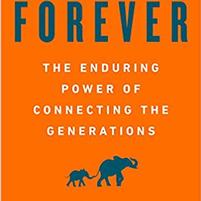At first blush, I didn't think a book entitled How to Live Forever was for me. I was expecting a hard sell on a new killer vitamin that would add years to my life...gene therapy that could prevent chronic disease...botox for the brain. That sort of thing.
As with many books, however, the book's main message is revealed in its sub-title: "The enduring power of connecting the generations." The author, Marc Freedman, CEO of Encore.org, wants us to understand that we live in an age-segregated society, one where housing, labour markets, education and pensions policy combine to separate the old from the young. This "age apartheid" is not only out of step with current demographic trends, he argues, but down-right counter-productive: It impedes the happiness of individuals, who benefit enormously from these cross-generational relationships, and it limits progress on a host of social ills.
To make this case, Freedman begins by walking us through an array of evidence to support the claim that older people are a largely untapped resource for social good. It's not just that there are so many of them. (In the U.S. alone, where most of his analysis focuses, there are soon to be more older people than younger ones.) It's that this cohort wants to help. Fully a third of older adults in the United States already exhibit "purpose beyond the self" - i.e., they identify, prioritise, and actively pursue goals that are both personally meaningful and contribute to the greater good. That's 34 million people over the age of 50 who are willing and able to tutor children, volunteer in their communities, clean the neighbourhood parks, or work for world peace.
But the numbers don't stop there. Like anyone who has spent his or her life immersed in the charitable sector, Freedman knows that without a strong evidence base, campaigning for what sounds like an intuitively compelling idea can only get you so far. Much of the first third of the book is thus about making the case for unleashing the potential of older adults. He cites an evaluation conducted on Big Brothers, Big Sisters programme, the flagship programme for mentoring children from disadvantaged backgrounds in the United States.
That study found that children who were randomly assigned mentors showed a 46% difference in drug use, a 50% difference in school truancy, and a 33% difference in violent behaviour. A randomised control trial conducted on Experience Corps, a project set up to mobilise older people to help low-income chldren with literacy skills, similarly discovered that students who worked with older volunteers scored 60 percent better on both reading comprehension and the sounding out of new words.
The punchline from this research is that relationships are the critical ingredient in well-being, both individual and societal. Or as Freedman puts it, "The real fountain of youth is in the same place it's always been: it's the fountain with youth."
With this backdrop, the book moves on to documenting an array of inspirational projects offering a glimpse of how, exactly, this inter-generational transfer is beginning to take hold. He documents one of his own organisation's signature programmes - the Encore Fellowship - which places older workers in a social purpose organisation and pays them (via corporate sponsorship) to provide advice on a high-impact assignment. He takes us on a journey to visit a utopian experiment in multi-generational living in Massachusetts, where people over 55 adopt children from the public foster care system, breaking the retirement village mentality that dominates the housing landscape in America. We visit a nursing home in Singapore that sits, cheek by jowl, with a childcare center on the very same premises.
Freedman's plea is to take the host of innovative, inter-generational projects springing up around the globe as an invitation to not just "Be Mortal" (à la Atul Gawande), but to "live mortal." We need, as individuals, to make choices to invest in things like a gap year for grown ups or to embark upon a Bar Mitzvah-type religious rite later in life to formally commit to leaving the world better than we found it. (Personally, I loved his idea of creating a Eulogy App to catalogue those virtues we would like to be remembered for beyond our resumés.)
It was only in the last part of the book that I began to worry. As Freedman himself concedes, "The forces that work against bringing innovation to scale, even successful innovation, are strong." He cites a lack of government funding as well as bureuacrtic inertia and the persistent ageism bias. I was shocked to learn that a mere two percent of American philanthropy goes into anything related to aging. That's pretty jaw-dropping statistic, given the demographic trends noted above.
But there's another obstacle Freedman doesn't address: it's not clear which political coalition would battle in favour of the sorts of inter-generational solutions he's advocating. As a political scientist, I kept thinking about how one moves from projects to policy. To do that, at least in the United States, it strikes me that one would need a cross-generational interest group to get behind this movement. But the most successful interest groups in American politics typically have a homogenous membership with a very focused aim: the AARP is a case in point.
As I neared the end of the book, I wracked my brains trying to think of an effective, cross-generational lobby for the sorts of policies that Freedman is advocating. I couldn't think of any. That doesn't mean one won't emerge and anyone reading this book who is at all interested in forging cross-generational policy initiatives will want to lay the groundwork for a constituency to champion this cause.
Perhaps the politics of connecting the generations will be the focus of Freedman's next book. I look forward to reading it.
About the Author
Delia Lloyd is a Visiting Fellow at the Oxford Institute of Population Ageing. A seasoned writer and editor, she worked for a decade in radio, print and online journalism. Her reporting and commentary have been featured on outlets including The New York Times, The Washington Post, The Guardian and The BBC World Service.
Comments Welcome
We welcome your comments on this or any of the Institute's blog posts. Please feel free to email comments to be posted on your behalf to administrator@ageing.ox.ac.uk or use the Disqus facility linked below.
Opinions of the blogger is their own and not endorsed by the Institute
Comments Welcome: We welcome your comments on this or any of the Institute's blog posts. Please feel free to email comments to be posted on your behalf to administrator@ageing.ox.ac.uk or use the Disqus facility linked below.













